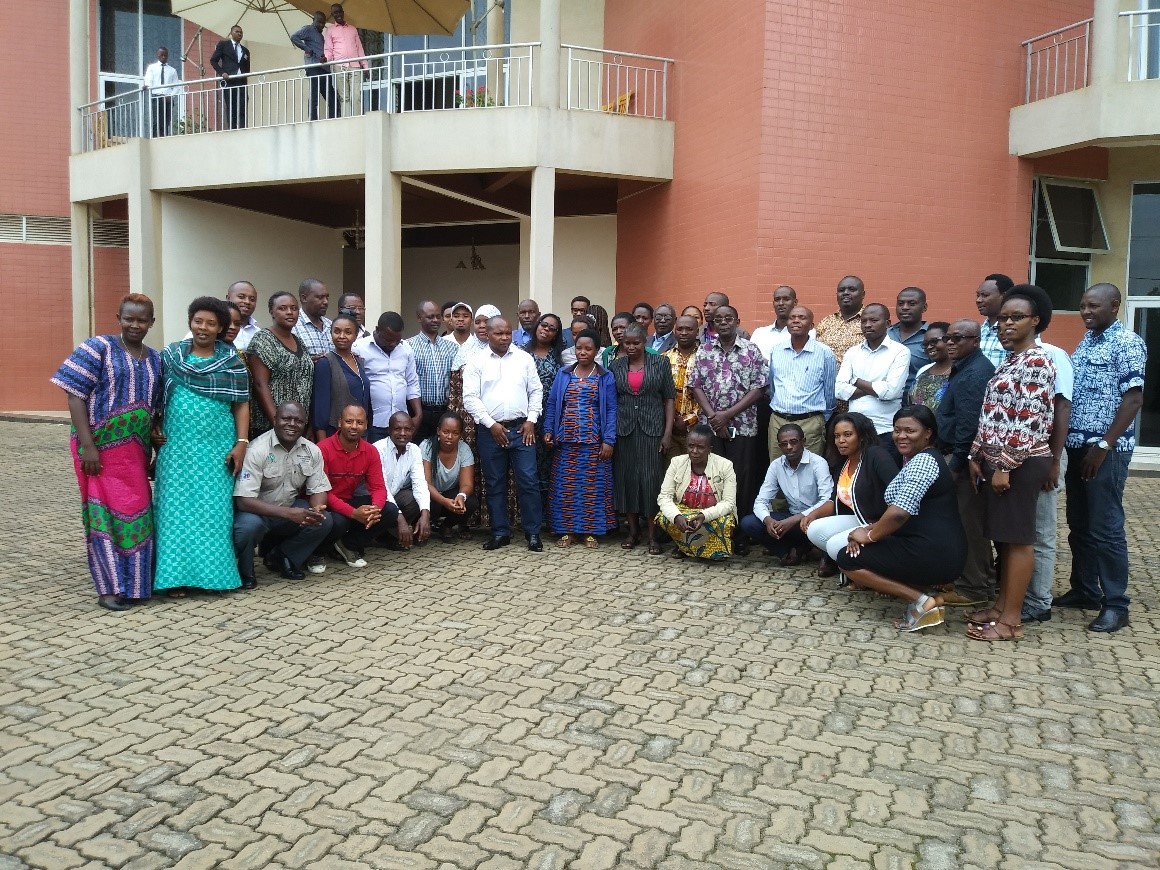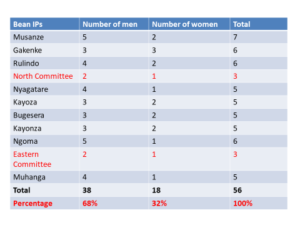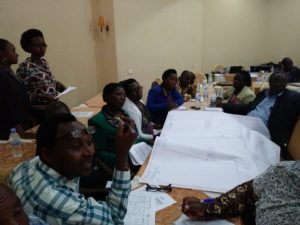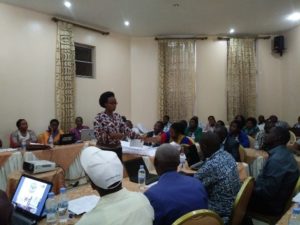Participants of the bean business platform workshop in Kigali, Rwanda. (Credit; Lilies Gachanja)
by Eileen Nchanji, Eliud Birachi, Mercy Mutua, Leonidas Dusenge and Lilies Gachanja
Pan Africa Bean Research Alliance (PABRA) carried out a bean business platform at the Bour Sejour Hotel in Kigali, Rwanda. This workshop which took place between 29th November and 1st December 2017, brought together farmers, private sector, Rwanda Agriculture Board (RAB) in an effort to educate the bean platform members on the corridor concept and gender.
Rwanda has crossed the 80% threshold in closing the gender gap and ranks fourth in the world according to the World Economic Forum (global gender gap report 2016). This calculation was based on improvements in economic participation, opportunity, political empowerment, and educational attainment. Rwanda also has the highest share of female parliamentarians in the world at 64%.
PABRA set out to understand whether these gains in bridging the gender gap have been translated to agriculture. Although agricultural and gender policies account for joint land ownership between men and women, and a mandatory 30% women representation in all decision making positions, in reality, women do not get this 30% mandatory representation in decision making. This reflects greatly in leadership positions, like the case of the bean business platforms.
What are the benefits of bean business platform?
A bean business platform brings together players in the value chain ranging from input suppliers, farmers, and service providers (extension, financial, warehousing, etc.), and is organized around a bean grain off-taker who may be a bean trader or a processor. The main objective is to organize bean farmers and supply them with the right seeds, fertilisers, agronomic skills and other support services such as market information, so that they can be able to produce enough quantities of the correct market demanded varieties of beans. With this demand-driven approach, traders and processors can get the right varieties of good quality bean grain while farmers have an assured market for their produce. This encourages producers to produce even more bean. The ultimate goal is to increase bean output through increased productivity, reduce post-harvest losses and minimize transaction costs through a well-organized production system and structured trade. PABRA is working to accomplish this goal through availing a forum where each of the business platform members can derive business sense while offering goods or services that benefit other players, in each of its bean production and aggregation hubs within the various bean corridors.
What is the place of women in the bean business platform?
The creation of a bean business platform in Rwanda saw the presence of few female farmers as members. This is as a result of the socio-cultural norms which decree that a woman’s place is at home. Even fewer women take part in any of the platform activities due to limited information on the importance of the platform as well as lack of self-confidence. The existing bean business platforms (in the corridors) totals 56 elected committee members. Of these members, 38 are men (68%), and 18 are women (32%) excluding the Southern corridor where elections are yet to take place (Figure 1).
The leadership position percentage for women meets the country’s mandatory 30% of women in all decision making bodies. Noteworthy is that women in the elected committees were voted in mainly as treasurers and advisors.
A presentation and discussion on the importance of mainstreaming gender into the platform defined gender equality as not equating women to men, but giving women opportunities they do not have to strengthen their partnership with men. As a result of this, the participants from different bean platforms all over the country, after several deliberations for two days, agreed unanimously to vote in two women or girls each into the executive committee in charge of gender. These new executive members are expected to make sure that gender is considered in all activities and ideas implemented by the platform. With this new initiative, the elected committee members for women will increase from 18 to 36. Therefore women’s percentage in leadership positions is now 48.6%. The participants also pledged to increase women quota in leadership positions to 50% in the next two years.
Empowering women through the bean business platform
Gender equality is not a new concept in Rwanda. Even though men and women are highly aware of the need to close the agricultural gender gap, they cannot do it alone. There is a need to actively engage all actors (partnership) involved in the bean value chain at local, national and international levels to ensure that all walk the talk on gender equality. Women should not just be seen, but they should be heard. The bean business platform is a forum through which women voices can be heard, as they are given the opportunity to make decisions that affect their agricultural and entrepreneurial activities. Business platforms are vehicles of economic empowerment, not just knowledge sharing. If women are left out, no other material empowerment can be envisaged for them, since they are mostly involved in agriculture.
Picture 3 and 4: Participants play a game to illustrate the importance of partnerships (Credit; Lilies Gachanja)





